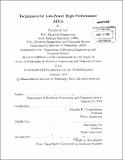Techniques for low-power high-performance ADCs
Author(s)
Lee, Sunghyuk
DownloadFull printable version (13.45Mb)
Alternative title
Techniques for low-power high-performance analog-to-digital converters
Other Contributors
Massachusetts Institute of Technology. Department of Electrical Engineering and Computer Science.
Advisor
Anantha P. Chandrakasan and Hae-Seung Lee.
Terms of use
Metadata
Show full item recordAbstract
Analog-to-digital converters (ADCs) are essential building blocks in many electronic systems which require digital signal processing and storage of analog signals. Traditionally, ADCs are considered a power hungry circuit. This thesis investigates ADC design techniques to achieve high-performance with low power consumption. Two designs are demonstrated. The first design is a voltage scalable zero-crossing based pipelined ADC. The zero-crossing based circuit technique is modified and optimized to improve the limited ADC resolution in nano-scaled CMOS technology. The proposed unidirectional charge transfer scheme allows faster and more energy efficient operation by eliminating unnecessary charging and discharging of the capacitors. Furthermore, the reduced transient disturbance at the beginning of the fine charge transfer phase improves the accuracy of operation. Power supply scaling enhances power efficiency at low sampling rates much like in digital circuits and widens the conversion frequency range where the ADC operates with highest efficiency. The second design is a high speed time-interleaved (TI) SAR ADC with background timing-skew calibration. A time-interleaved structure is employed to improve the effective sampling rate without sacrificing energy efficiency. SAR ADCs are used for each channel to make good use of device scaling. The proposed ADC architecture incorporates a flash ADC operating at the full sampling rate of the TI ADC. The flash ADC output is multiplexed to resolve MSBs of the SAR channels. Because the full-speed flash ADC does not suffer from timing-skew errors, the flash ADC output is also used as the timing reference to estimate the timing-skew of the SAR ADCs.
Description
Thesis: Ph. D., Massachusetts Institute of Technology, Department of Electrical Engineering and Computer Science, 2014. Cataloged from PDF version of thesis. Includes bibliographical references (pages 127-133).
Date issued
2014Department
Massachusetts Institute of Technology. Department of Electrical Engineering and Computer SciencePublisher
Massachusetts Institute of Technology
Keywords
Electrical Engineering and Computer Science.